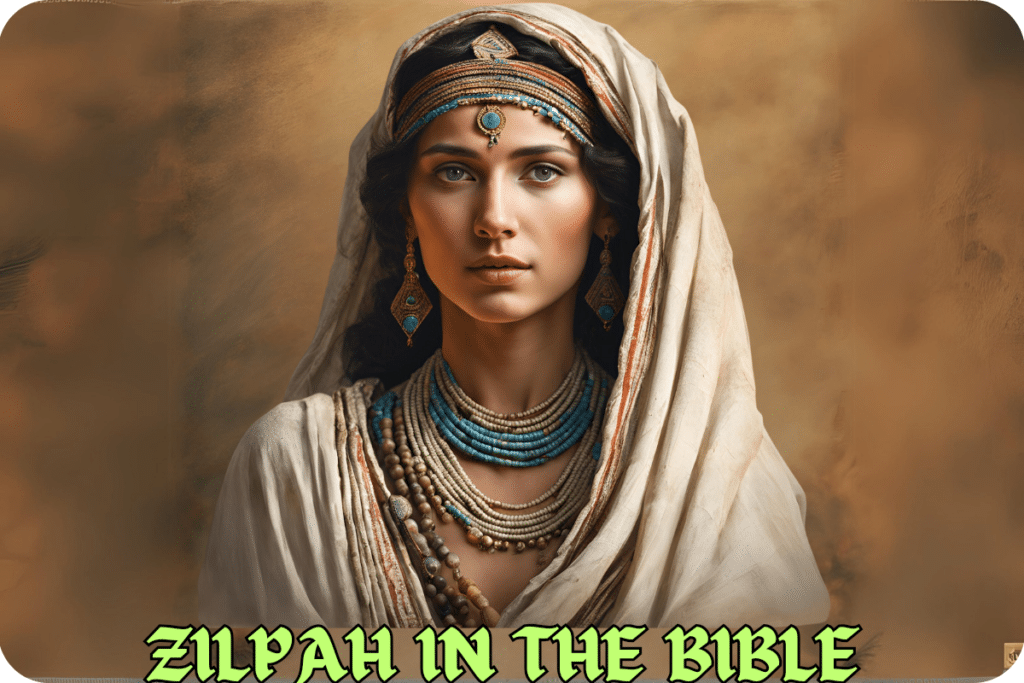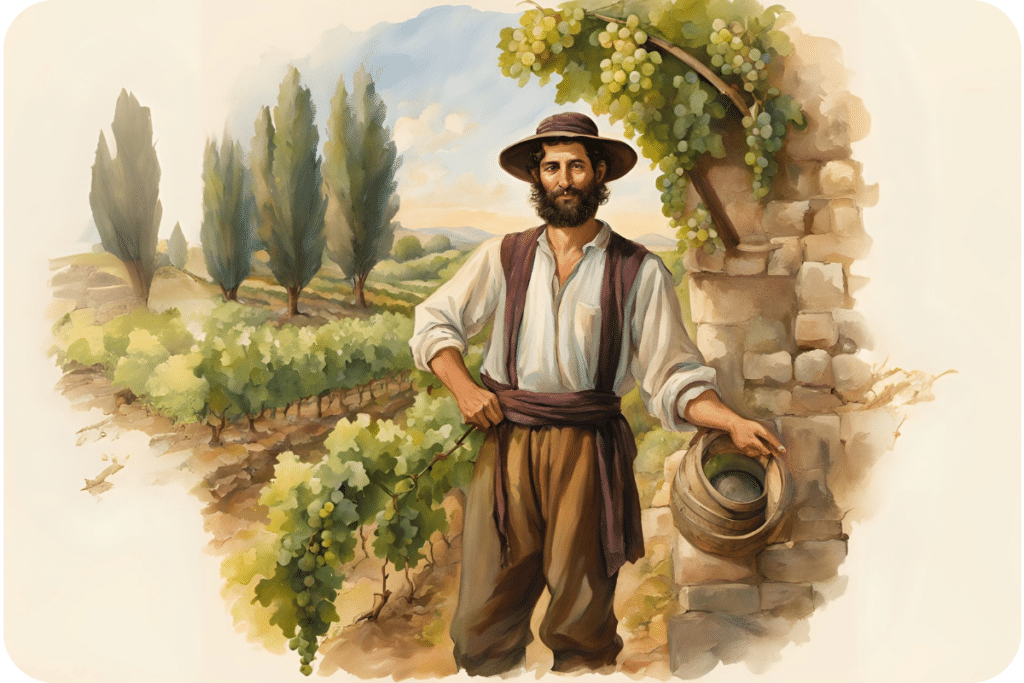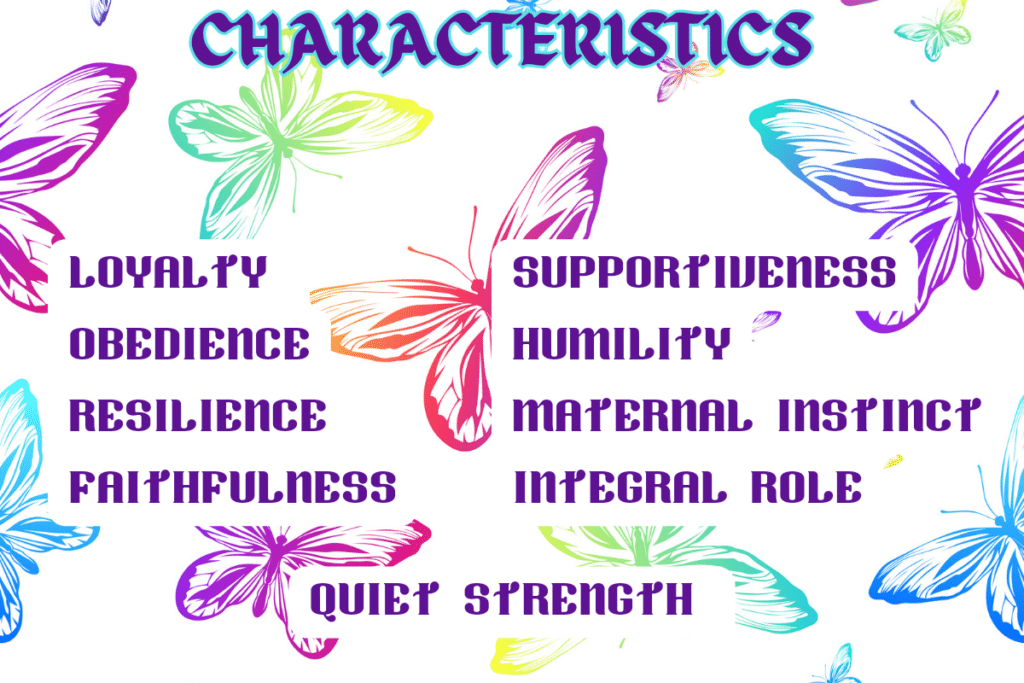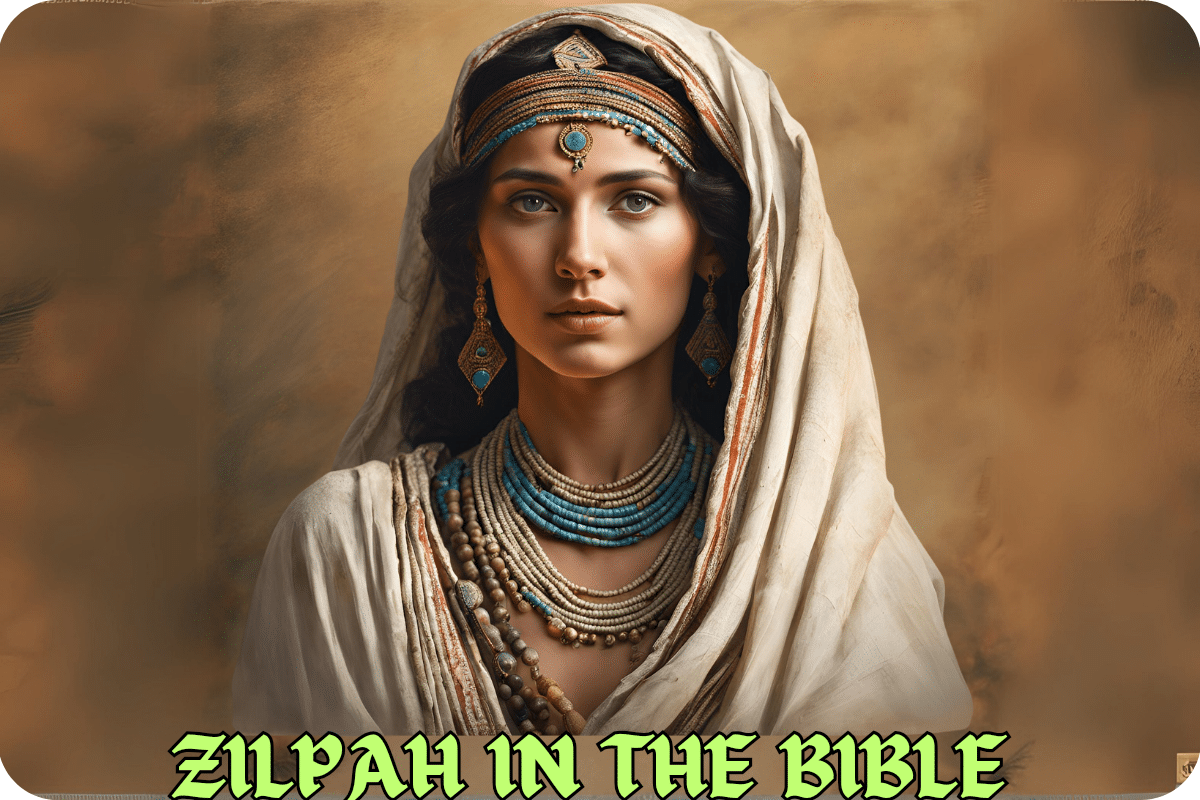ZEST ZILPAH IN THE BIBLE
Zilpah in the Bible is a minor figure but played a crucial role in the unfolding of Jacob’s family history. As Leah’s handmaid, Zilpah bore Jacob two sons, Gad and Asher, who became the progenitors of two of the twelve tribes of Israel. Zilpah’s story highlights the complex social dynamics of ancient times, where women’s status and the legitimacy of their children were often tied to their position in the household.

Despite her humble beginnings, Zilpah’s sons were blessed by Jacob and became important figures in the history of the Israelites. Zilpah’s story underscores the significance of every individual in the grand tapestry of biblical history.
The name “Zilpah” has its roots in Hebrew and is spelled זִלְפָּה (Zilpah) in the original biblical texts. The exact meaning of Zilpah is somewhat debated among scholars, but it is generally thought to mean “frailty,” “drooping,” or “weakness.” Some interpretations also suggest it could mean “to trickle” or “to pour out.” These meanings can be seen as reflecting the humble and often overlooked status of Zilpah in the biblical narrative.
Historical Context
The story of Zilpah in the Bible, reflects the centrality of the patriarchal family structure in ancient times, where family lineage and inheritance were paramount. As a handmaid to Leah, Zilpah played a crucial role in maintaining the household and ensuring the continuity of Jacob’s family.
Though her status was subordinate to the wives, Zilpah’s bearing of sons, Gad and Asher, who became progenitors of two of the twelve tribes of Israel, underscores the importance of women’s roles in this patriarchal society. Zilpah’s story highlights how, within the constraints of her time, she made significant contributions to the unfolding of biblical history.
Background of Zilpah in the Bible
Zilpah in the Bible, was a handmaid given to Leah by her father Laban upon Leah’s marriage to Jacob. Though her exact origins are unclear, it is likely that Zilpah was a slave or servant in Laban’s household who was then passed on to Leah as part of her dowry. This practice of providing handmaids to wives was common in ancient times, as seen in the parallel case of Bilhah being given to Rachel. Zilpah’s story highlights the complex social dynamics and limited agency of women, even those in positions of relative privilege like Leah, in the patriarchal society of ancient Israel.
Zilpah in the Bible, as a Handmaid
In the patriarchal society of ancient Israel, handmaids like Zilpah in the Bible played a crucial role in extending the reproductive capacity of their mistresses. As Leah’s handmaid, Zilpah was given to Jacob as a concubine, allowing Leah to bear additional children through her. This practice, though exploitative, was a common way for women to maintain their status and secure their place in the household.
Zilpah’s two sons, Gad and Asher, became progenitors of two of the twelve tribes of Israel, underscoring how her role as a handmaid was integral to the continuity of the patriarchal family structure. Zilpah’s story highlights the complex social dynamics and limited agency of women in this ancient context.
Leah and Zilpah’s Relationship
Leah, who was less favored by Jacob compared to her sister Rachel, relied on Zilpah in the Bible, to bolster her position within the household. The relationship between Leah and Zilpah can be seen as both hierarchical and collaborative. Zilpah’s contribution of children to Leah’s household helped Leah gain standing in the eyes of Jacob and within the larger family structure.
Zilpah and Jacob
Zilpah in the Bible became a concubine to Jacob as part of Leah’s strategy to increase her own children. In this context, Zilpah’s relationship with Jacob was more of a functional one, aimed at increasing Leah’s progeny rather than forming a romantic bond. Despite this, Zilpah’s role as a mother is significant in the biblical narrative.
The Birth of Gad
Zilpah’s first son with Jacob was named Gad, a name that means “good fortune” or “troop” in Hebrew. Leah, Zilpah’s mistress, declared this upon Gad’s birth, reflecting the good fortune his birth brought to the household. Gad went on to become the founder of the tribe of Gad, one of the twelve tribes of Israel.

The tribe of Gad was known for its military prowess and bravery, as evidenced by the prophecies of Jacob and Moses that the tribe would contain brave troops to drive off Israel’s enemies. Gad’s story highlights how even minor biblical figures like Zilpah played crucial roles in the unfolding of Israel’s history.

The Birth of Asher
Asher, Zilpah’s second son with Jacob, was named to reflect Leah’s joy and sense of blessing at his birth. The name Asher means “happy” or “blessed” in Hebrew. Asher’s tribe became known for their prosperity and fertile land, occupying territory with some of the richest soil in Canaan. They produced abundant grain, wine, oil, and minerals, contributing significantly to the agricultural wealth of ancient Israel.

Asher’s blessing from Jacob foretold that his “bread shall be fat, and he shall yield royal dainties”, while Moses blessed him with the promise of abundant oil and minerals. Asher’s story highlights how even minor biblical figures like Zilpah played crucial roles in the unfolding of Israel’s history.

Zilpah’s Contribution to the Tribes of Israel
Zilpah’s sons Gad and Asher became patriarchs of two of the twelve tribes of Israel. The tribe of Gad was known for its military prowess, with Jacob prophesying they would provide brave troops to lead Israel to victory. The tribe of Asher occupied fertile territory, contributing significantly to Israel’s agricultural wealth with abundant grain, wine, oil, and minerals.
Though Zilpah in the Bible was a minor figure, her sons’ tribes played important roles in the development of ancient Israel. Gad guarded Israel’s northeastern border, while Asher’s men humbled themselves to attend King Hezekiah’s Passover celebration in Jerusalem centuries later. Zilpah’s descendants shaped the social, military, and economic fabric of biblical history.
Zilpah in Biblical Genealogies
In the genealogical records of the Bible, Zilpah is mentioned as the mother of Gad and Asher. Her inclusion in these records underscores the importance of her contributions to the lineage of Israel, ensuring that her role, though seemingly secondary, is acknowledged and preserved in the history of God’s people.
Zilpah in Jewish Tradition
In Jewish tradition, Zilpah in the Bible is often seen as a figure of quiet strength and duty. Her role as a handmaid who became a mother of two tribes illustrates the theme of God’s providence and the elevation of the humble to significant roles within His plan.
Zilpah in Christian Perspectives
Christian interpretations of the story of Zilpah in the Bible often emphasize the themes of service and faithfulness. Zilpah’s life is seen as an example of how God uses all individuals, regardless of their social status or background, to fulfill His purposes. Her story highlights the value of each person in the broader narrative of salvation history.
Lessons from Zilpah in the Bible
The story of Zilpah in the Bible, though not as prominent as some others in the Bible, offers valuable lessons that resonate with themes of service, humility, and divine purpose. Here are some key lessons we can learn from her life:
1. The Value of Service and Duty
Zilpah in the Bible, exemplifies the importance of faithfully serving others. As Leah’s handmaid, she took on roles and responsibilities that were crucial to Leah’s standing within Jacob’s family. Her service highlights how dedication and commitment to one’s duties, even when not in the spotlight, are essential and impactful.
2. God’s Use of the Humble
Zilpah’s elevation from a handmaid to the mother of two of Israel’s tribes demonstrates how God often uses those in humble positions to achieve significant purposes. This teaches us that no role is too small in the divine plan and that every individual can contribute meaningfully to God’s work.
3. Quiet Strength and Resilience
Despite her lower social status, Zilpah’s quiet strength and resilience enabled her to fulfill her role effectively. She faced her circumstances with perseverance, contributing to the broader narrative of Israel’s history. Her life encourages us to be strong and resilient, no matter our situation.
4. The Importance of Legacy
The legacy of Zilpah in the Bible, is carried on through her sons, Gad and Asher, who became patriarchs of two tribes of Israel. This underscores the importance of our contributions and how they can have lasting impacts beyond our immediate lives. Our actions and roles can shape future generations in ways we might not immediately realize.
5. Embracing Unrecognized Roles
The story of Zilpah in the Bible reminds us that many crucial roles in life are often unrecognized or undervalued. Her contributions, though not as celebrated as those of others, were vital to the fulfillment of God’s promise to Jacob. This teaches us to embrace and find value in all roles, understanding that they all contribute to a greater purpose.
6. Loyalty and Faithfulness
Her loyalty to Leah and her faithfulness in her duties to Jacob highlight the virtues of loyalty and faithfulness. In a world that often prioritizes recognition and status, the life Zilpah in the Bible encourages us to remain loyal and faithful to our responsibilities and relationships, knowing that these virtues are honored by God.
Zilpah in the Bible, marked by service, resilience, and faithfulness, offers profound lessons that continue to resonate. Her story teaches us that everyone has a role in the divine narrative, no matter how humble it may seem. By embracing our duties with dedication and recognizing the value of every role, we contribute to a legacy that can impact generations.
Modern Interpretations of Zilpah in the Bible
Contemporary scholars and theologians often view Zilpah in the Bible as a symbol of resilience and quiet strength. Her story is relevant in discussions on the roles of women in the Bible and their contributions to biblical history, highlighting the importance of recognizing and valuing every individual’s contribution, regardless of their status.
Characteristics of Zilpah in the Bible

Zilpah in the Bible though a less prominent figure, is a character who embodies several noteworthy traits. Her story, though brief, reveals important aspects of her personality and role in the lives of Jacob and Leah, and in the history of Israel. Here are some key characteristics of Zilpah:
1. Loyalty
Zilpah’s loyalty is evident in her dedication to Leah. As Leah’s handmaid, she faithfully served her and became a concubine to Jacob to help Leah bear more children. Her unwavering support for Leah demonstrates her deep loyalty.
2. Obedience
In her role as a handmaid, Zilpah showed great obedience. She accepted her responsibilities without complaint, including becoming a concubine to Jacob at Leah’s request. This obedience was crucial in the familial dynamics and lineage of Jacob.
3. Resilience
Despite her lower status and the challenges that came with it, Zilpah displayed resilience. She adapted to her circumstances and played her part in fulfilling Leah’s and Jacob’s desires for more offspring, contributing to the establishment of the twelve tribes of Israel.
4. Faithfulness
Zilpah’s faithfulness is highlighted in her commitment to her duties and her role within Jacob’s family. She remained faithful to her responsibilities, ensuring the well-being of her children and supporting Leah in her quest for prominence within the family.
5. Supportiveness
As Leah’s handmaid, Zilpah was a supportive figure. She provided Leah with the means to compete with Rachel, Jacob’s more favored wife, by bearing children on Leah’s behalf. This support was crucial for Leah in maintaining her status within the family.
6. Humility
Zilpah’s humility is a prominent characteristic. She accepted her position as a handmaid and later as a concubine without seeking personal glory or recognition. Her humble acceptance of her role and her contributions to the family highlight her modest nature.
7. Maternal Instinct
Despite the complex family dynamics, Zilpah demonstrated strong maternal instincts. She bore and raised Gad and Asher, ensuring their well-being and contributing to their future roles as patriarchs of two of Israel’s tribes.
8. Integral Role
Zilpah’s role, though secondary, was integral to the fulfillment of God’s promise to Jacob. Her contributions helped shape the lineage and history of the Israelites, emphasizing the importance of every individual in God’s plan.
9. Quiet Strength
Zilpah possessed a quiet strength that allowed her to fulfill her duties without complaint. Her strength lay in her ability to endure and contribute meaningfully, even when her role was not prominently recognized.
Zilpah’s characteristics of loyalty, obedience, resilience, faithfulness, supportiveness, humility, maternal instinct, integral role, and quiet strength make her a significant, though often overlooked, figure in the Bible. Her story reminds us of the value of every individual and the impact of their contributions, no matter how humble they may seem.
Conclusion
Zilpah’s story, though brief, is a testament to the significant roles played by seemingly minor characters in the biblical narrative. Her contributions through her sons Gad and Asher to the twelve tribes of Israel reflect the theme of God’s use of all individuals to accomplish His purposes. Zilpah’s legacy is one of faithfulness, duty, and the elevation of the humble in the divine plan.
Reference
Unique FAQ’s
1. Who was Zilpah in the Bible? Zilpah was a handmaid given to Leah by her father Laban. She became a concubine to Jacob and bore him two sons, Gad and Asher, who became patriarchs of two of the twelve tribes of Israel.
2. What is the significance of Zilpah’s children? Zilpah’s children, Gad and Asher, became leaders of two of the twelve tribes of Israel. Their tribes contributed significantly to the military and economic life of ancient Israel.
3. How is Zilpah portrayed in different religious traditions? In Jewish tradition, Zilpah is seen as a figure of duty and quiet strength. Christian perspectives emphasize her role in God’s providential plan, highlighting themes of service and faithfulness.
4. What lessons can we learn from Zilpah’s story? Zilpah’s story teaches us about the importance of service, loyalty, and how God can elevate those in humble positions to fulfill significant roles in His plan.
5. Why is Zilpah important in the context of the tribes of Israel? Zilpah’s importance lies in her contribution to the lineage of the twelve tribes of Israel. Her sons, Gad and Asher, founded tribes that played crucial roles in the formation and development of the nation of Israel.


1 thought on “54. ZEST ZILPAH IN THE BIBLE”